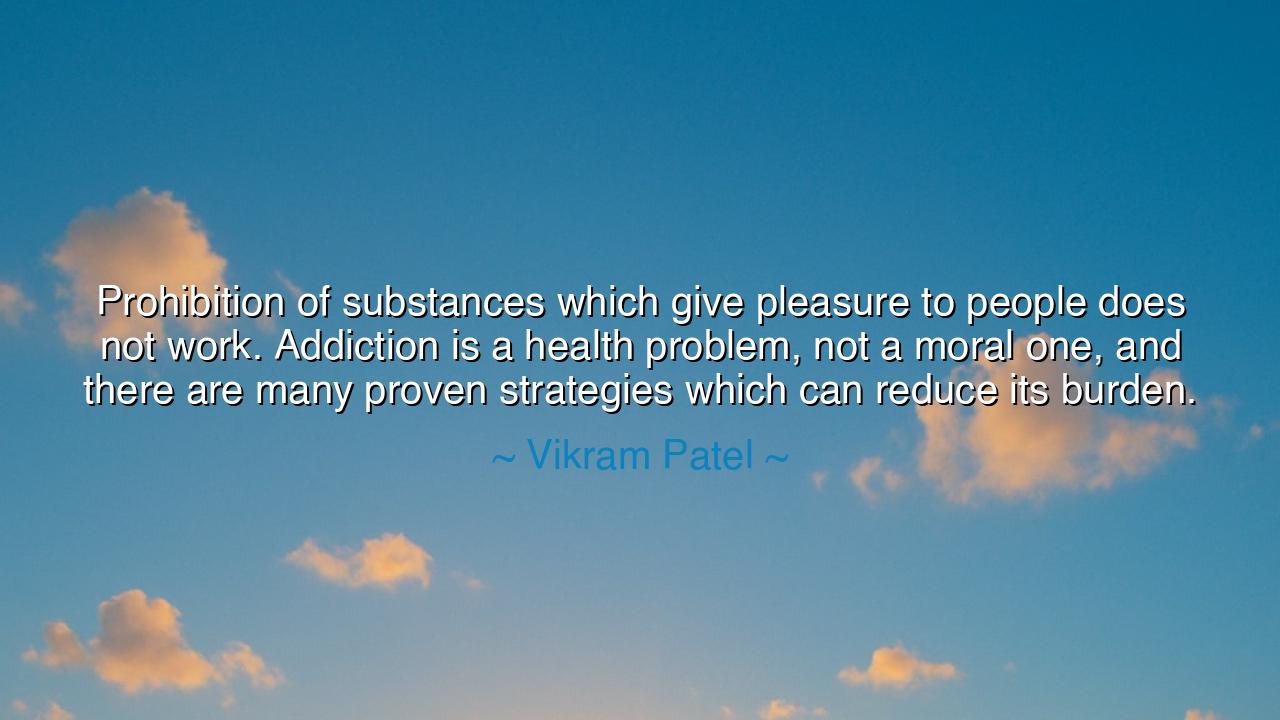
Prohibition of substances which give pleasure to people does not
Prohibition of substances which give pleasure to people does not work. Addiction is a health problem, not a moral one, and there are many proven strategies which can reduce its burden.






In the compassionate and truth-bearing words of Vikram Patel, we hear not merely the voice of a physician, but the wisdom of a philosopher who understands the human heart: “Prohibition of substances which give pleasure to people does not work. Addiction is a health problem, not a moral one, and there are many proven strategies which can reduce its burden.” These words, though clothed in the language of science and public policy, speak of something far older — the eternal struggle between punishment and understanding, between ignorance and empathy. In them, Patel calls us to look upon suffering not with judgment, but with mercy, and to see in the afflicted not sinners, but souls in pain.
From the time of the ancients, societies have grappled with the temptations that arise from pleasure. The Greeks spoke of hedone, the sweet allure that could elevate the spirit or enslave it. Yet even they knew that to conquer vice, one must understand it. To deny human desire is to deny human nature itself. Thus, when Patel declares that prohibition does not work, he speaks a truth proven by history: laws that seek to erase the yearning for pleasure have always failed, for the thirst of the heart cannot be silenced by decree. It can only be healed by wisdom and compassion.
The origin of Patel’s quote arises from his life’s work as a psychiatrist and global mental health advocate. In the villages of India and the cities of the world, he has seen how addiction binds not only the body, but the soul. He has witnessed how societies, blinded by moral indignation, cast the suffering aside — locking them away, condemning them, or denying their humanity. But as the healer knows, punishment does not cure illness. His words are a call to return to the ancient principle of treating disease at its root, of seeing the wounded spirit not as wicked but as worthy of care.
Consider the tale of Prohibition in early 20th-century America. When lawmakers sought to outlaw alcohol, they believed they were purifying the nation. Yet what followed was not sobriety, but chaos — the rise of black markets, crime, and corruption. The desire for escape, for pleasure, for relief, did not vanish; it merely hid in shadow. When the law was repealed, the lesson was clear: one cannot legislate away human craving. The only true remedy lies in understanding why the craving exists — in addressing the despair that drives it. Patel’s wisdom stands as the modern echo of that ancient truth.
To say that addiction is a health problem, not a moral one, is to return to the path of compassion. Just as we would not scorn the fevered or the blind, so too must we not condemn those ensnared by addiction. The affliction lies not in wickedness but in imbalance — of mind, of spirit, of circumstance. The one who drinks, smokes, or uses is not seeking destruction, but comfort; not rebellion, but relief. To heal them, we must offer not punishment, but understanding; not shame, but care. The physician’s role, and indeed society’s role, is not to judge the fallen, but to lift them gently toward recovery.
Patel reminds us that there are proven strategies to reduce this burden — evidence that healing is possible when love replaces fear. Community care, education, therapy, and harm reduction have shown again and again that when we treat addiction as illness, not immorality, we restore lives rather than destroy them. This is not weakness, but wisdom. The ancients would have called it phronesis — the practical virtue of acting with compassion guided by knowledge. For what greater act of courage is there than to respond to suffering with kindness in a world that demands condemnation?
And so, let this be the lesson passed to future generations: seek to heal, not to punish. If you see one lost in the shadows of addiction, do not turn away in judgment, but approach in empathy. Remember that every craving has a story, every struggle a wound unseen. To help the suffering is to serve humanity itself. Build a world where science walks hand in hand with mercy, where understanding triumphs over fear.
For as Vikram Patel teaches, no soul is beyond redemption, no illness beyond healing. The true strength of a society lies not in how harshly it condemns, but in how deeply it cares. Let compassion be your law, and wisdom your guide. For only through these can we transform pain into recovery, despair into renewal, and the fragile heart of humanity into something whole once more.






AAdministratorAdministrator
Welcome, honored guests. Please leave a comment, we will respond soon